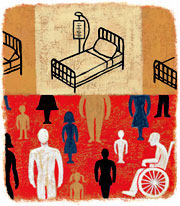
 |
|||
| |
|||
 |
 Health Care Crisis Spills into the ER A Cincinnati doctor sympathizes with emergency room patients who have long waits — and nowhere else to go for medical care. by Dan Handel Outside, the sirens in the ambulance bay and the rotors of a helicopter landing on the helipad herald the arrival of a very sick person, someone who will shortly become my patient. Working at University Hospital in Cincinnati is both a blessing and a curse. Just north of downtown, the surrounding poor neighborhood provides us with a significant amount of our indigent patients. Several of the roads I pass every day on my way to work serve as battlefields where poverty is a breeding ground for violence. As the only Level I trauma center in the area, we are a large referral hospital. While not technically a “county” hospital, we are the place patients come when they have nowhere else to go. In my training as a resident physician, seeing such a diverse population is a good thing. The experience will serve me well when I am an attending physician, but it makes for a busy ER at all hours. At times, the constant influx of patients makes me feel I am waging a losing battle. How can I see all of these patients? If you think working in the ER is anything like the television series of that name, you are sorely mistaken. Think of that as the highlight reel, with the mundane moments filling the time between. Emergency rooms across the country make up the safety net for health care, with people coming to us when they cannot afford to see a regular doctor, either due to lack of money and/or insurance. It is not uncommon for patients to present complaints spanning weeks, months, even years. Even in a city whose taxes support a large community clinic system, there are people whose minimum-wage jobs prevent them from going during business hours. People come to the ER as their primary source of care and for countless medication refills for chronic conditions. Furthermore, in a poor economy, the unemployed become uninsured. The worse the Dow Jones industrial average, the busier we are. The issue of hospital diversion (when hospitals divert ambulances, except for the most seriously ill or injured patients, due to staff shortages or the lack of available beds) looms as one of the many problems with our health care system. The medical literature has shown that the No. 1 cause of diversion is the lack of inpatient hospital beds. When an ER goes on diversion, it is due to the fact that hospitals cannot find beds for admitted patients on the inpatient wards. When University Hospital goes on diversion, greater than half of the beds in the ER are filled by patients waiting for inpatient beds upstairs. These unfortunate people, already uncomfortable from their illness, sometimes spend more than 12 hours before leaving the noisy environment of our ER for a quiet, more private room upstairs. In the waiting area, patients sometimes wait six or more hours to be seen due to the backlog. Nationwide, this occurrence has unfortunately become the norm instead of the exception. Why are there bed shortages? Two major reasons: facility limitations and staff shortages. The boom of the economy and health care in the 1980s and early ’90s, with great employee benefits and health insurance plans, has reversed itself. ERs are not profitable, and many hospitals have closed their ER doors to cut costs, simply taking admissions from clinic referrals. Large employers use their size to cut hospital reimbursements in an effort to cut costs, leaving hospitals with less revenue for the same services. Health care is not immune to economics, and those left behind face the dilemma of finding staff, especially nurses, to run their wards so as not to compromise patient safety. Nationwide, sorely needed beds go unused for lack of personnel. As an impatient man, I can sympathize with my patients for their long waits. The health care system itself is indeed in a crisis and deserves the same attention from the public that the diseases we treat have received. A national health care system is one possible solution, but even that comes at a cost. If one is unable to see the doctor, even the easiest of cures become inaccessible. At the end of a shift, I go home hoping I have helped some people or at least eased their suffering. I feel fortunate to be able to care for people regardless of their insurance status or ability to pay. It is my hope that the system will survive for me to continue to do this for years to come. Dan Handel (WCAS97, FSM02, GFSM02) is an emergency medicine resident physician at the University Hospital at the University of Cincinnati. He is the editor of EMResident, a newsletter addressing the issues facing emergency medicine residents. We’re always on the lookout for fresh alumni insights. If you’d like to submit an essay, click here.
|